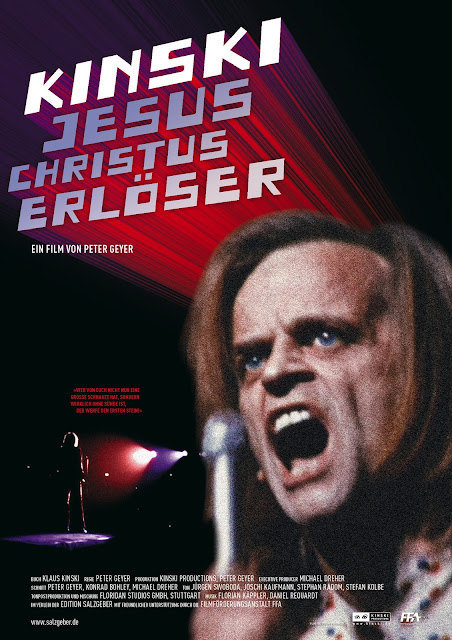The first film that I ever saw Klaus Kinski in was a little picture called Timestalkers, stumbled upon while dredging through the cesspool that is the hulu free movie library. Timestalkers was a terrible turd of a film, having something to do with time travel, the old west and other such bullshit, better served as material for Rifftrax or Cinematic Titanic rather than something people actually paid to see. The name of Kinski literally meant nothing to me at the time, but the name wedged itself into my consciousness for some unknown reason, thankfully the only distinct memory I have from that film. It wasn’t really until I watched My Best Friend, the documentary by Werner Herzog recounting his working and personal relationship with him, that I understood that Herr Kinski was in point of fact an incredibly accomplished and well respected stage & screen actor. And also a bit of a psychopath, which is exactly the kind of thing I needed to perk my interest and seek out one of his motion pictures to see for myself.
I think you can see where I’m going with this.
Jesus Christ Savior, or Jesus Christus Erlöser for our more Germanic readers, is a recording of a one-man show Klaus Kinski performed in Berlin November 20th, 1971. As you could imagine, the performance (a monologue done on an elevated platform on stage, a ‘sermon on the mount’ if you will) was about Jesus. Not the Jesus that the church and society have pushed upon us, the Jesus that is merely a symbol carried upon an ‘infamous cross’, but Kinski’s vision of the Messenger of Peace: Friend to the prisoners, the orphans, the anti-social, hippies, bums, junkies, the ‘screaming mothers in Vietnam’, etc. Half a story of Jesus being persecuted in modern society, half a diatribe against society in general, Klaus Kinski rails against the bankers and lawmakers of the world and demands that people love their enemies. Not suggest, DEMAND. Kinski’s Jesus is a figure, but he don’t take no wishy-washy bullshit. It’s his way or the highway.
If you think that a play entirely focused on the actor saying that talking about how everyone else’s interpretation of Jesus is totally wrong would not go over well, you’d be right. The Saxon equivalent of Statler & Waldorf turns out to be a large and vocal part of the movie, from simple heckling to people actually going up on stage and stopping the show entirely. Klaus takes the criticism about as well as he seems to take anything negative against him, meaning he goes completely apeshit. Every time it happens there’s just an incredible feeling of tension yet at the same mesmerizing, because Kinski’s meltdowns are such grand gestures that you can’t help but get swept in this avalanche of emotion that he’s throwing at anyone and everyone within range of his voice. In Klaus Kinski’s theater he’s the Sturm und the Drang, if you get what I’m saying.
It’s that energy that somehow keeps 90 minutes of a guy doing nothing but talking so engaging. Klaus Kinski has an incredible stage presence, this masterful use of quiet intensity that draws your full attention to him no matter what he’s doing. The closest approximation most people would know would be Christopher Lee, but Lee’s presence is that of the classical Englishman; cool, composed, imposing but in a more passive manner. Klaus is much more the aggressor, through sheer force he gives you no other option but to watch him. Observing such a mastery over the art of speaking is truly fascinating, in truth I had to pause the video several times just to give myself some breathing room. Metaphorically speaking.
Maybe I’m hyping up this film a bit too much, but if the pro-Jesus anti-Christianity message doesn’t turn you off, then you might be interested in seeing this. Klaus Kinski was definitely a prima-donna, but that excessive pride was tempered with an equally excessive dedication to his craft. Watch a Muhammad Ali fight to see a man who understands boxing, watch this film to see a man who understands acting. And don’t watch Timestalkers at all.
At. All.




No comments:
Post a Comment